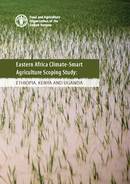Technical reports
This publication was commissioned under the auspices of the project “FAO technical support to the COMESA-EAC-SADC program on climate change adaptation and mitigation in Eastern and Southern Africa (OSRO/RAF/307/COM)”. The study goal was to consult with stakeholders, including government departments, the private sector, civil society organizations, development partners, research institutions and NGOs involved in current and past climate-smart agriculture initiatives in the Eastern Africa (EA) sub-region, to map, review, analyse and synthesize major past and current CSA initiatives, in order to document the key stakeholders involved, the policies in place and the constraints, challenges, opportunities and enabling factors to adoption of climate-smart agriculture practices and technologies in the subregion.
The evidence is clear: to change behaviour ‘environmental education’ needs to change its focus – with less emphasis on knowledge and raising awareness (although still needed) and more on competency, action skills and problem solving (Marcinkowski, 2010). This report reviews the evidence base to establish which educational methods are proven to have an impact on behavior. The research is summarized and evaluated to develop a set of recommendations on how to better focus educational activities for maximum impact on individuals, local communities and the wider world. The challenge for educators now is to turn this evidence into reality; to develop and deliver educational resources and experiences that trigger long-term behavior change.




